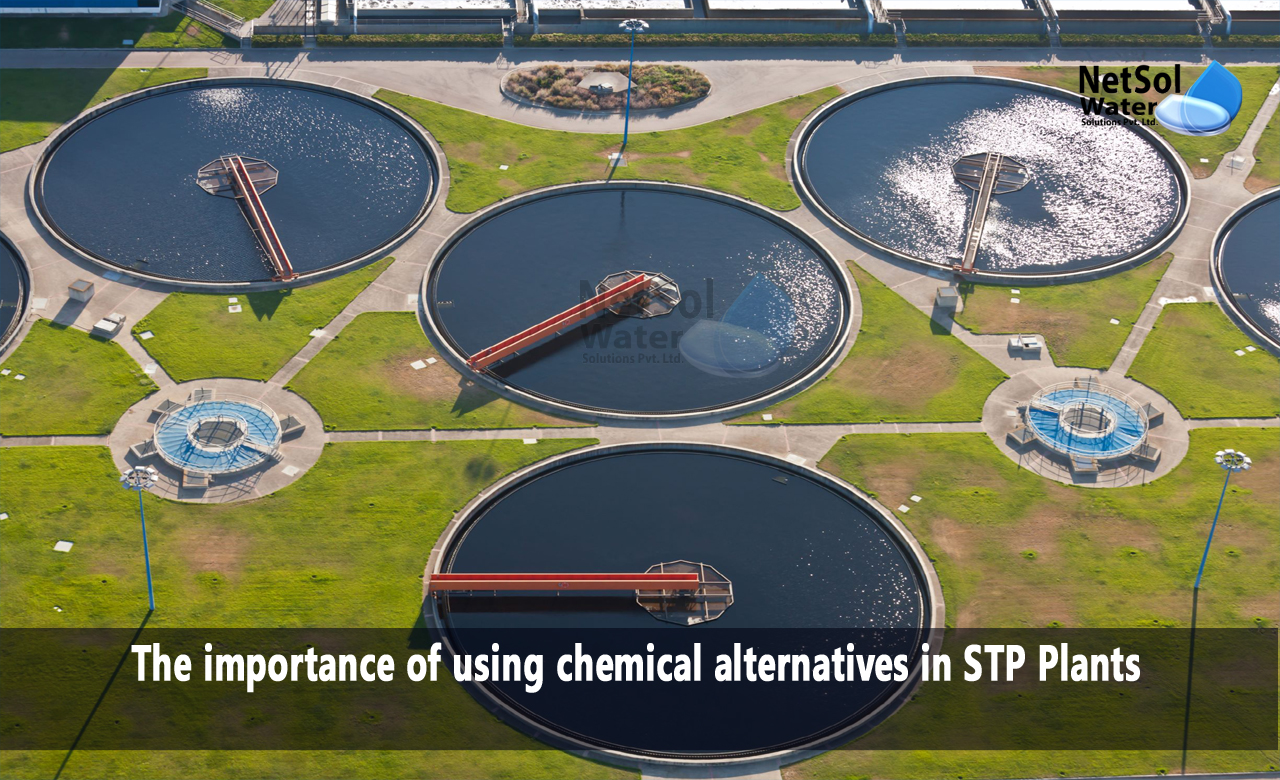What is the importance of using chemical alternatives in STP Plants?
Sewage treatment plants (STPs) play a vital role in safeguarding public health and protecting the environment by treating wastewater before its discharge into water bodies. While the primary focus of STPs is the removal of physical, biological, and chemical contaminants from wastewater, it is essential to consider the environmental impact of the treatment processes themselves.
This blog highlights the importance of using sustainable chemical alternatives in sewage treatment plants to promote safer treatment processes and minimize adverse effects on human health and the ecosystem.
The Need for Sustainable Chemical Alternatives
Traditional sewage treatment processes often involve the use of chemicals, such as disinfectants, coagulants, and pH adjusters, to achieve effective treatment outcomes. However, many of these chemicals pose risks to human health and the environment. For instance, the use of chlorine-based disinfectants can lead to the formation of harmful disinfection by-products, including trihalomethanes, which are associated with various health concerns. Additionally, the release of these chemicals into water bodies can have adverse effects on aquatic organisms and ecosystems.
By adopting sustainable chemical alternatives, sewage treatment plants can significantly reduce the negative impacts of chemical usage while ensuring effective treatment outcomes. These alternatives are characterized by their minimal toxicity, reduced environmental persistence, and ability to degrade into harmless substances. Implementing sustainable chemical alternatives in STPs promotes the principles of green chemistry and contributes to a more sustainable and environmentally friendly treatment process.
Promoting Sustainable Chemical Alternatives
- Non-Chlorine Disinfection: Chlorine-based disinfectants have been widely used in STPs due to their effectiveness in controlling pathogens. However, alternatives such as ultraviolet (UV) disinfection and advanced oxidation processes (AOPs) can provide effective disinfection without the formation of harmful by-products. UV disinfection utilizes ultraviolet light to inactivate pathogens, while AOPs employ powerful oxidants like hydrogen peroxide or ozone to degrade contaminants. These methods offer a safer and more sustainable approach to disinfection.
- Natural Coagulants and Flocculants: Coagulants and flocculants are used to facilitate the removal of suspended solids and impurities during wastewater treatment. Traditional chemicals like aluminum and iron salts can be replaced with natural alternatives such as plant-based coagulants (e.g., tannins, chitosan) and bio-based polymers. These sustainable alternatives are biodegradable, non-toxic, and do not contribute to the accumulation of harmful residues in water bodies.
- Phosphate-Free Chemicals: Phosphorus removal is a critical aspect of wastewater treatment to prevent eutrophication in receiving water bodies. Instead of using chemicals containing phosphates, which can contribute to nutrient pollution, STPs can adopt phosphate-free alternatives. This includes using biological processes, such as enhanced biological phosphorus removal (EBPR), or employing innovative technologies like struvite precipitation for efficient phosphorus recovery.
- Green Solvents for Cleaning and Maintenance: Maintenance and cleaning activities in STPs often involve the use of solvents that may be harmful to human health and the environment. Substituting these chemicals with green solvents, derived from renewable resources and with low toxicity, reduces the risk of exposure and minimizes environmental contamination.
Benefits of Sustainable Chemical Alternatives
The adoption of sustainable chemical alternatives in sewage treatment plants offers several benefits:
- Environmental Protection: Sustainable chemical alternatives minimize the release of harmful substances into water bodies, preserving water quality and safeguarding aquatic ecosystems. This helps maintain biodiversity, protects sensitive species, and promotes overall environmental health.
- Human Health and Safety: By reducing the use of toxic chemicals, the risks to the health and safety of STP operators, workers, and nearby communities are minimized. This creates a safer working environment and mitigates potential health impacts associated with exposure to hazardous substances.
- Compliance with Regulations: Many regions have implemented stricter regulations on wastewater discharges and chemical usage in STPs. By adopting sustainable chemical alternatives, treatment plants can ensure compliance with these regulations and avoid penalties or legal issues.
- Public Perception and Trust: Embracing sustainable practices, including the use of environmentally friendly chemicals, enhances the public perception of sewage treatment plants. This fosters trust and confidence among the community, demonstrating the commitment to protect both human health and the environment.
Conclusion
Sustainable chemical alternatives in sewage treatment plants are essential for promoting safer treatment processes, protecting the environment, and ensuring the well-being of communities. By replacing traditional chemicals with non-toxic and environmentally friendly alternatives, STPs can achieve effective treatment outcomes while minimizing negative impacts on human health and the ecosystem. Embracing sustainable practices in chemical usage contributes to the principles of green chemistry and demonstrates a commitment to creating a more sustainable and ecologically responsible approach to wastewater treatment. By adopting these alternatives, sewage treatment plants can become true champions of environmental stewardship and pave the way for a greener future.
Netsol Water is Greater Noida-based leading water & wastewater treatment plant manufacturer. We are industry's most demanding company based on client review and work quality. We are known as best commercial RO plant manufacturers, industrial RO plant manufacturer, sewage treatment plant manufacturer, Water Softener Plant Manufacturers and effluent treatment plant manufacturers. Apart from this 24x7 customer support is our USP. Call on +91-9650608473, or write us at enquiry@netsolwater.com for any support, inquiry or product-purchase related query.



